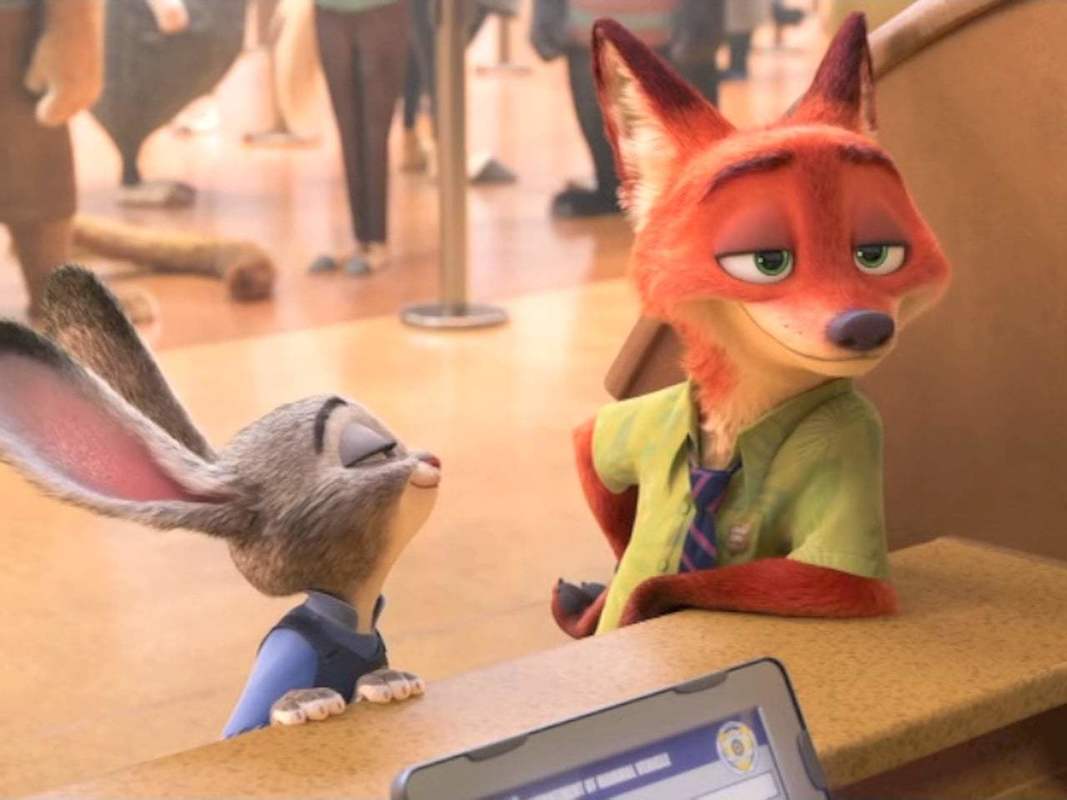With a writing and directing staff populated both by Disney in-house experts like Jennifer Lee from Frozen and veterans of the prime years of the Simpsons like Rich Moore and Jim Reardon, it’s no surprise that Zootopia is intricately animated and often funny. A centerpiece scene involving sloths at the DMV is brimming with comic timing and the fine detail of each perforation on two sheets of paper being delicately separated. Judy’s dad gives Homer-esque ‘never try’ anti-advice to his progeny, while a sequence at an animal nudist spa features vaudevillian bits that lose nothing despite their well-worn nature. The animators are also working hard to make characters look painfully adorable. The film begins with a children’s play that delineates the world’s rules, and if you’ve ever wondered how cute a cartoon baby leopard trying to hit his stage marks, the answer is ‘very.’ Zootopia is considerably accomplished as a piece of entertainment, by turns complex and simplistic in its many charms.
What’s less thought out is its politics, which the film wears on its sleeve. Zootopia is in deep with contemporary political correctness when it admonishes characters for touching a sheep’s wool or calling a bunny ‘cute,’ as only other bunnies are allowed to do that, and also, don’t call them bunnies. This is mildly amusing and definitely unique for a wide-audience film. The films gets more complex with its delving into unconscious bias, sweeping the HR departments of corporate America and the made-up police stations of Zootopia. Since a run-in with a fox bully as a child, Judy’s long been fearful of foxes, and the film takes pains to show her being especially wary around Nick in the early goings. She insists on taking fox repellant with her just in case, and she goes for it at the slightest provocation. It’s a recognizable facsimile of real-world scenarios, coupled with the belief amongst the prey creatures, who make up the majority of the population, that their predator neighbors could snap at any moment. At its root, the film’s ‘people are good and worthy of trust’ message is barely more complex than the ‘achieve your dreams’ one also coursing through Zootopia, but the way it goes about the former is what attracted so much attention to it.
However, if a film wants to be taken seriously, as the contemporary relevance of Zootopia suggests that it does, then let’s take it seriously. The police work that Judy engages in is an authoritarian dream. She’s able to crack the case through extortion, ubiquitous state monitoring of its citizens, and torture contracted through nefarious third parties. If Dick Cheney watched animated films, he’d be a big fan of Judy Hops and her methods. The mayor played by JK Simmons is lying to the populace and illegally detaining animals, but he was trying to protect everyone so it’s treated as perfectly fine. As long as everyone’s nice to each other and there’s some level of equal opportunity, the everyone’s satisfied. It’s benevolent dictatorship as the garden of Eden, where lions lay down with lambs under the watchful eye of the state. The film either doesn’t see what Judy is actually doing to unearth the conspiracy, or it doesn’t care.
Zootopia posits a particular liberal fantasy, where individuals of all different types go to Shakira concerts brimming with positivity and congratulate themselves for spending so much time in a diverse and affirming setting, all while turning a blind eye to subtler and more pervasive problems. In its view, the cops treat everyone equally, shining the state’s vast power onto them free from prejudice. This is fuzzy Jack Bauer, one more piece of capable entertainment that gets its audience more comfortable with omnipresent security. The satirical minds behind the Simpsons should know better. In reaching for political relevance, Zootopia reveals how blinkered it is. Police work is supposed to be difficult, but in the shining titular city, everyone’s a friend and everyone’s being watched. C+

 RSS Feed
RSS Feed